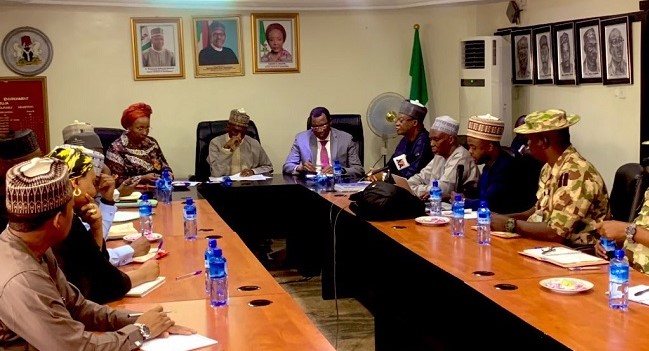The Executive Secretary, Lake Chad Basin Commission, Amb. Mamman Nuhu, has urged the Federal Ministry of Environment in Nigeria to support the implementation of Regional Stabilisation Strategy (RSS) document for the intervention of the Lake Chad.

Nuhu made the call when he led a delegation from the commission to present the RSS document to the Minister of Environment, Dr Mohammad Abubakar, on Monday, March 16, 2020 in Abuja, the federal capital city.
He said that the strategy was very important and the ministry of environment “is central to its implementation in areas of intervention such as climate change, economic recovery and environmental sustainability, inter-governmental cooperation, education and empowering women and youths.’’
He said that the ministry had great impact and role to play in to succeed in implementation of the strategy.
Nuhu said that the strategy document was put together in 2017 and member countries and relevant ministries were represented at different meetings and came up with the regional stabilisation document.
He said the document was validated on August 2018 by the Minister of Water Resources and the process of implementation had been on since then.
According to him, eight affected states and provinces in the riverine countries of Lake Chad which three states are in Nigeria, two in Cameroon and two in Chad and one in Niger.
He said that the governors of these affected states and provinces would produce territorial action plan implementation.
“We are paying visits to countries that are directly affected on the establishment and implemented strategy and ministry of environment is directly at the centre.
“We know the fate of Lake Chad, climate change; environmental degradation and insecurity around the Lake Chad has made the ministry of environment central.
“This called for synergy between the federal, state governments, agencies and organisations that are supposed to implement the document,’’ he said.
Nuhu said that Lake Chad has shrunk from 25,000 square km in 1960 to 4,000 square km presently due to the impact of climate change.
Responding, the Minister of Environment said the ministry would provide support to stabilise and restore the livelihood of people affected by environmental degradation in the country, especially in the Lake Chad region.
Abubakar said that the ministry would pay attention on the four pillars areas in the RSS document that concerns it and would also go the extra miles to stabilise the issue of climate change.
He said that economic recovery and environmental sustainability, inter-governmental cooperation, education and empowering women and youths were parts of what the ministry had been doing.
“We will improve on these areas; since the disappearing of Lake Chad, a lot of things have happened; there is destabilisation in the economy, among others.
“With political will that we have, we will do what it takes and even go beyond the call of duties to support this in totality.
“We will cooperate and work with all the MDAs listed in the document to stabilise, restore the livelihood to curb insecurity in the areas.’’
Dr Peter Tarfa, the Director, Climate Change Department of the ministry, said the nine pillars were very critical toward achieving the aims and objectives of the document.
Tarfa said that the ministry had spoken with the UNICEF and the Ministry of Education on the need to include issues of climate change into school curriculum.
“We also want the curriculum for education under this pillar to involve sustainability and climate change; there are some resistances in terms of cultural practices but if we get the young one involved, they will help in promoting the environment,’’ he said.
By Francisca Oluyole
